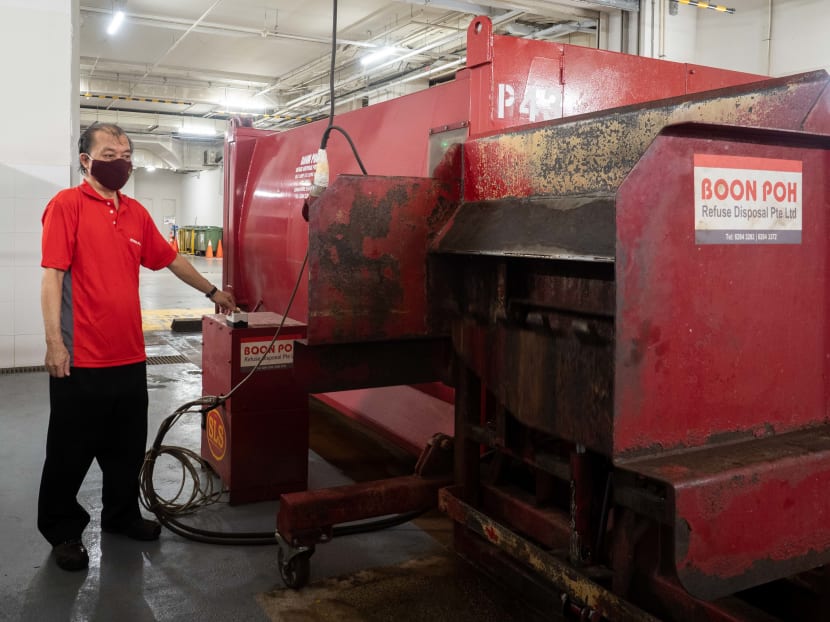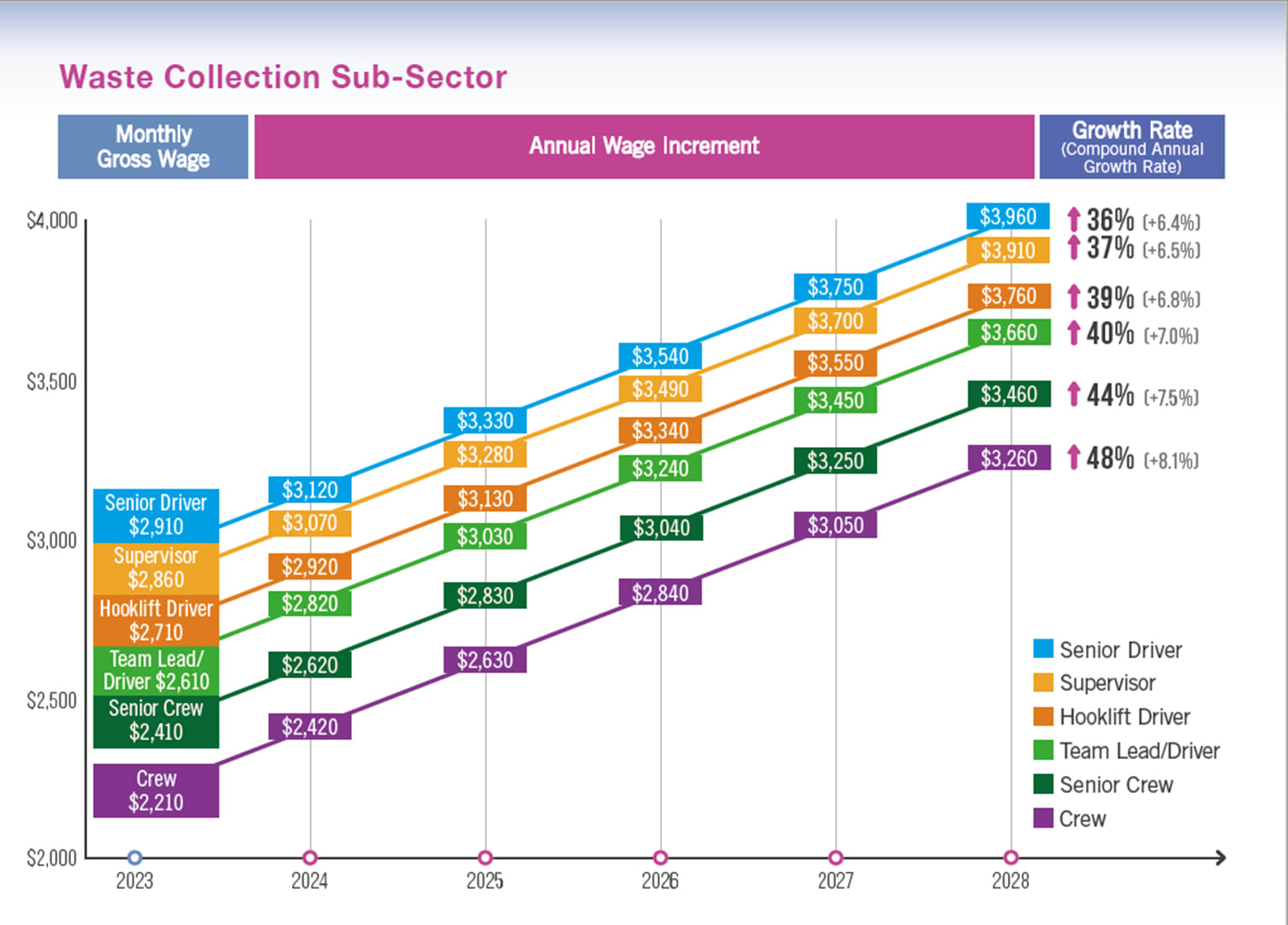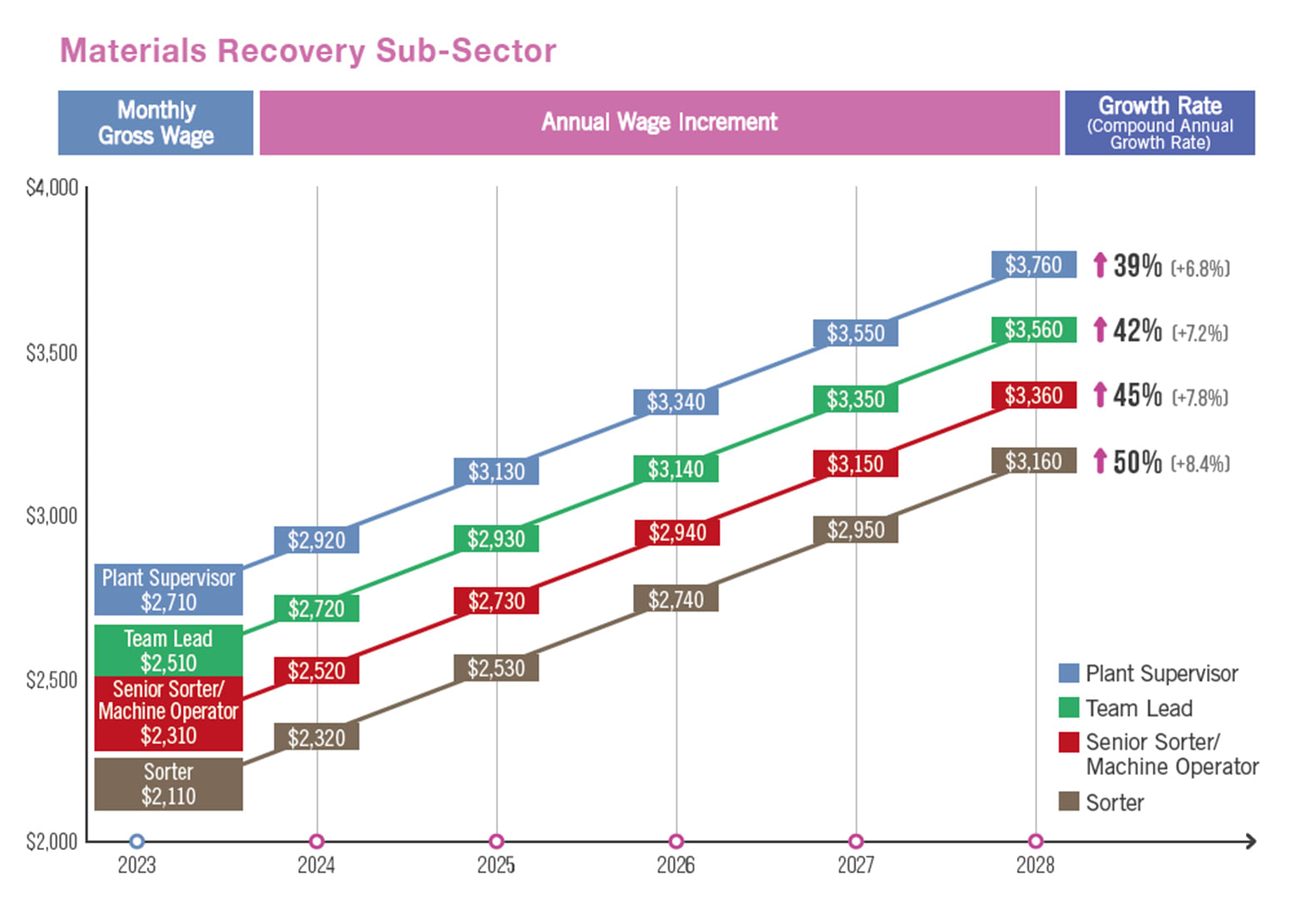Minimum monthly salary for entry level waste collectors to nearly double to S$3,260 by 2028
SINGAPORE — By 2028, an entry-level waste management worker can expect to draw a minimum gross salary of S$3,260 a month, up from current levels of about S$1,600 to S$1,800. And from 2024, eligible workers in the sector can expect to receive mandatory annual bonuses.

Waste sorter Yeo Hock Lye operating a trash compactor on Jan 24, 2022.
- The Government on Jan 24 accepted recommendations to implement a progressive wage model for waste management workers
- Under the model, entry-level workers in the sector can expect to draw a monthly salary of S$3,260 by 2028
- Current pay levels in the sector are around S$1,600 to S$1,800 a month, based on industry figures
- The wage model applies to Singapore citizens and permanent residents
SINGAPORE — By 2028, an entry-level waste management worker can expect to draw a minimum gross salary of S$3,260 a month, up from current levels of about S$1,600 to S$1,800. And from 2024, eligible workers in the sector can expect to receive mandatory annual bonuses.
The detailed outline of salaries came after the Government on Monday (Jan 24) accepted recommendations by a tripartite cluster to implement the progressive wage model (PWM) for the waste management sector.
The model — first used in 2012 and has since been rolled out to the cleaning, security, landscape, and lift and escalator sectors — is a framework to peg wages to skills, productivity and career development.
Up to 3,000 Singaporean and permanent resident workers, who make up more than half the workers in the waste management and materials recovery sub-sectors, are expected to benefit from this revised wage framework that is set to take effect progressively from July 2023.
Other recommendations by the Tripartite Cluster for Wage Management include mandatory training requirements across all job roles and outlining clear career progression pathways for workers.
JUMP FROM EARNINGS OF UNDER S$2,000
Workers in the waste collection sub-sector can expect a minimum monthly gross wage ranging from S$2,210 to S$2,910 starting from July 2023.
These salaries, which exclude overtime pay, will rise by an average of 6.4 per cent to 8.1 per cent annually over six years, reaching a range of S$3,260 to S$3,960 by 2028 depending on the specific job.
Workers in the materials recovery sub-sector will see their gross wages jump from between S$2,110 and S$2,710 to S$3,160 and S$3,760 over the same period.
As a comparison, the average basic monthly salaries earned now by workers in the industry here are about S$1,600 to S$1,800, the Waste Management & Recycling Association of Singapore said. The association is a part of the Tripartite Cluster for Wage Management.


OTHER RECOMMENDATIONS
The progressive wage model stipulates a mandatory bonus for some workers from January 2024. Workers who have worked a minimum of 12 months for the same employer will receive no less than one month’s worth of salary as their annual bonus.
Besides revisions in terms of remuneration, the model also sets out structured training requirements to continually enhance the skills and productivity of workers.
For example, lower-level employees must complete a minimum of two Workforce Skills Qualifications (WSQ) training modules. They will be required to complete more modules as they progress to more advanced jobs in their career.
BEARING THE COSTS TOGETHER
Mr Yeo Hock Lye, 61, who works as a waste sorter, said that he has received wage increments of about S$50 a year over his 14 years in the industry.
With the newly announced changes, he said that he looks forward to “learning new things” while earning more.
His employer, Ms Lim Lijuan, director at Boon Poh Refuse Disposal, said that in the past, some service buyers have indicated hesitance when providers such as her company propose increase in prices to accommodate higher wages for workers.
She hopes that with the launch of the progressive wage model for the waste management sector, buyers will soon be willing to fork out more as they see that the cost increase is “across the board”.
“After all, this increase in costs will go to the workers and benefit our locals,” she added.
Ms Lim also drew attention to how the Covid-19 pandemic has accentuated the industry's manpower crunch, and hopes that the more structured career progression offered can help attract more resident workers to what she describes as “not a sexy industry”.
Speaking to the media after the launch of the wage model for the sector, Mr Zaqy Mohamad, Senior Minister of State for Manpower, highlighted that the wage revisions have to go hand-in-hand with industry and business transformation to increase productivity.
“If you do not transform businesses and do not transform industries, you will have challenges in sustaining this for the long term, because you have to justify as well, why is the worker paid more,” he said.
He drew attention to the security industry, which had already taken up the progressive wage model, to illustrate job transformations.
While the number of security officers needed for each site may drop due to enhanced productivity, he said that “overall, the sector will grow” due to demand for more diverse and advanced skill sets, such as for people to work as drone operators.
Besides the security industry, others that have been using the progressive wage model are the cleaning, landscape as well as lift and escalator sectors.
Touching on the potential cost increase that customers may bear as wages rise, Mr Zaqy stressed on the role that the society as a whole has to play in order to be more inclusive and help raise the earnings of fellow residents, especially those from lower-income groups.
However, he gave an assurance that the industry can expect some form of government support for businesses, which will be revealed in detail during the upcoming Budget next month.
“Rest assured the intent is to ensure that we achieve our goals (of the wage model) but at the same time, we also want businesses to do so sustainably,” he said.








